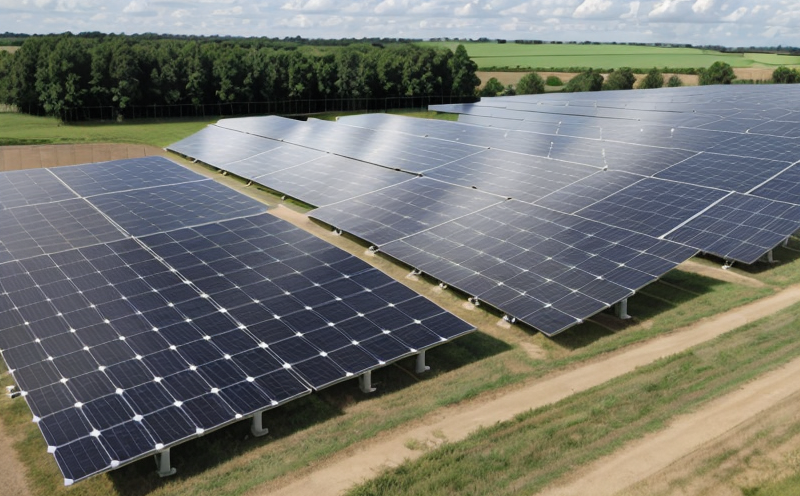IEC 61730 Safety Testing of PV Modules
The International Electrotechnical Commission’s (IEC) IEC 61730 is a suite of standards designed to ensure the safety and reliability of photovoltaic (PV) modules. These tests are critical for manufacturers, installers, and regulatory bodies looking to verify that PV systems meet global safety requirements.
The standard covers various aspects including mechanical strength, electrical performance, aging resistance, and fire resistance. It is applicable to crystalline silicon and thin-film photovoltaic modules used in standalone applications or connected to a grid.
Testing under IEC 61730 ensures that PV modules are safe for installation and operation, reducing the risk of accidents and failures. This standard plays an essential role in promoting public safety and environmental sustainability by ensuring the integrity of solar energy systems.
The testing process involves several stages to evaluate different aspects of a PV module's performance. For instance, the mechanical tests assess the module’s ability to withstand wind loads, snow accumulation, and hail impacts. Electrical tests focus on verifying the module’s power output under various conditions, including short circuit current, open-circuit voltage, and maximum power point.
The standard also includes aging resistance tests that simulate real-world environmental stressors such as UV radiation, humidity, and temperature cycling to ensure long-term durability. Fire resistance testing evaluates a module's ability to prevent or contain fire propagation in the event of an internal fault.
In addition to these physical tests, IEC 61730 also covers documentation requirements that ensure manufacturers provide detailed information about their products. This includes data on electrical performance, mechanical properties, and environmental resistance. Compliance with this standard helps manufacturers meet international safety standards and gain market access in countries where it is mandatory.
The importance of IEC 61730 cannot be overstated, especially as the demand for renewable energy continues to grow globally. By adhering to these stringent tests, PV module manufacturers can assure stakeholders that their products are safe, reliable, and environmentally responsible. This not only enhances public trust but also supports broader sustainability goals by ensuring the integrity of solar installations.
At Eurolab, we employ state-of-the-art facilities and equipment to conduct IEC 61730 testing rigorously. Our team of experts ensures that every module undergoes thorough evaluation according to the latest standards. This commitment to quality guarantees that our clients can trust in the safety and performance of their PV products.
- Our advanced laboratories are equipped with cutting-edge test rigs for mechanical strength, electrical performance, aging resistance, and fire resistance.
- We adhere strictly to IEC 61730-2 and -3 standards ensuring comprehensive coverage of all testing requirements.
- Data accuracy and reliability are paramount in our testing process; we use high-resolution measurement tools and software for precise analysis.
Benefits
Compliance with IEC 61730 not only protects end-users but also supports broader sustainability goals. By ensuring the safety and reliability of PV modules, this standard contributes to reducing the environmental impact associated with solar energy installations.
The tests help manufacturers identify potential flaws early in the production process, allowing for corrective actions before the product reaches the market. This proactive approach minimizes the risk of recalls and warranty claims, thereby enhancing brand reputation and customer satisfaction.
Moreover, passing these safety tests opens up opportunities for global market access. Many countries mandate compliance with IEC 61730 to ensure public safety and environmental protection. By meeting this standard, manufacturers can easily enter markets that have stringent regulatory requirements.
The long-term benefits extend beyond immediate sales; compliant products are more likely to be chosen by discerning buyers who prioritize quality and sustainability. This can lead to increased market share and customer loyalty over time.
Lastly, IEC 61730 testing supports the transition towards a greener future by ensuring that renewable energy systems are reliable and safe. By promoting the use of high-quality PV modules, this standard contributes to reducing carbon footprints and supporting global efforts in combating climate change.
Eurolab Advantages
At Eurolab, we pride ourselves on providing top-tier testing services that exceed industry expectations. Our expertise lies in delivering accurate, reliable, and timely results for IEC 61730 compliance.
- Accurate Testing Equipment: We use only the latest and most precise instruments to ensure data accuracy and consistency.
- Comprehensive Coverage: Our facilities are equipped with all necessary test rigs for mechanical, electrical, aging, and fire resistance tests as per IEC 61730-2 and -3 standards.
- Rigorous Quality Control: Every sample undergoes multiple checks to ensure that it meets the required specifications before final certification is issued.
Our experienced team of engineers and technicians ensures a seamless testing process, from initial consultation to final report delivery. We understand the importance of timely results and strive to meet tight deadlines without compromising on quality.
In addition to our technical capabilities, Eurolab offers unparalleled customer service. Our dedicated account managers work closely with clients throughout the testing process, providing guidance and support whenever needed. This personalized approach ensures that every client receives the attention they deserve.
Environmental and Sustainability Contributions
- Reduction in Energy Loss: By ensuring the reliability of PV modules, IEC 61730 testing helps reduce energy losses during operation. This contributes to more efficient solar power generation.
- Promotion of Sustainable Manufacturing Practices: Adherence to this standard encourages manufacturers to adopt sustainable practices in their production processes, thereby minimizing environmental impact.
- Enhanced Public Trust: Safe and reliable PV modules instill public trust, leading to increased acceptance of solar energy solutions. This supports the broader adoption of renewable energy technologies.
The IEC 61730 standard is a cornerstone in promoting sustainable practices within the power sector. By ensuring that PV systems are safe and reliable, this standard contributes significantly to global efforts towards reducing carbon emissions and combating climate change.





